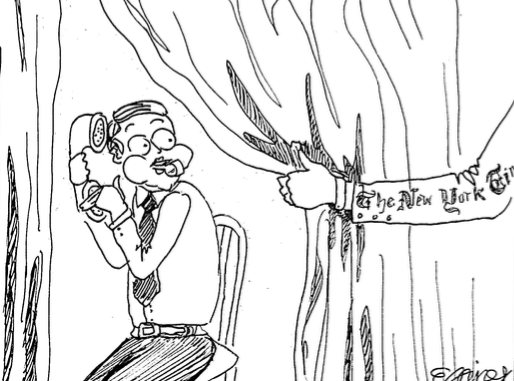
In an attempt to prompt a discussion on the credibility of the Trump whistleblower, The New York Times calls into question their own.
On Sept. 24, when House Speaker Nancy Pelosi announced a formal impeachment inquiry into President Donald Trump’s dealings with Ukraine, a media storm naturally ensued. There was a lot to unpack for the average American citizen: What did this mean? How long would it take? Most importantly, to some: where did this all begin?
To answer these questions, the responsibility was placed, in some sort of unsaid agreement, on the press. Publications began running stories detailing what lead to the impeachment inquiry, all of them referencing an anonymous whistleblower who compiled the report.
The report, which was made public on Sept. 26, contained information on President Trump’s suspicious phone call with the president of Ukraine, as well as “a series of events that took place over months involving Trump that tell a story of a concerted, continuous pressure campaign on the Ukrainian government to start these investigations that would help Trump politically,” according to Vox.
While media organizations and the country as a whole attempted to interpret the report, an article published by The New York Times on Sept. 26 entered a new element into an already divisive discussion.
The article, titled “White House Knew of Whistle-Blower’s Allegations Soon After Trump’s Call With Ukraine Leader,” contained information that, at first glance, may seem harmless. In the introductory paragraph, the reference to the whistle-blower as “a C.I.A. officer” seems nonchalant, something like a well-known fact hastily thrown in.
This, of course, was not the case. While a simple job title may not have been enough to spark controversy (the exact number of C.I.A. officers is not public information, though it can be assumed that it is a large number), the article went on.
“The whistle-blower was detailed to work at the White House at one point,” the authors wrote. “And has since returned to the C.I.A.”
Furthermore, “his complaint suggested he was an analyst by training,” and later on, “The C.I.A. officer did not work on the communications team that handles calls with foreign leaders.”
Piecing together those bits of information scattered throughout the article, one can conclude that the whistle-blower: is a man, is a C.I.A. officer, was at one time working in the White House, has currently returned to work at the C.I.A., and did not perform work with one specific C.I.A. communications team.
We at The New Paltz Oracle oppose The New York Times’ decision to publish this extensive information on the identity of the whistle-blower. Not only does having this information not benefit the public, it also puts the whistleblower at extreme risk.
Shortly after the article was published, The Times was met with criticism surrounding their decision. That same day, a comment by Dean Baquet, executive editor at The Times, was made public. Baquet defended the decision, stating that “the president and some of his supporters have attacked the credibility of the whistle-blower,” and that they published the details to “provide information to readers that allows them to make their own judgments about whether or not he is credible.”
The comment goes on to state, “We also understand that the White House already knew he was a C.I.A. officer.”
While this may be true, Baquet clearly leaves out the fact that much more information than just the whistle-blower’s job title was made public in the article. It makes you wonder: how much thought really went into this extremely high-stakes decision?
On the same day The Times published their article containing information on the identity of the whistleblower, President Trump made a comment at the United States Mission to the United Nations stating that he wants to know the identity of the whistle-blower because “that’s close to a spy” and “in the old days,” he said, “we used to handle it a little differently than we do now.”
Clearly, not good intentions. Intentions The Times may have made easier to play out.
Aside from Trump, a legion of his supporters are joining in on the hunt to unmask the whistleblower. An article published by The Washington Post on Sept. 28 includes quotes from internet forums, like 4Chan and Reddit, where pro-Trump users are scavenging the report for details that will aid them in identifying the individual.
“Time to rise up. Your president has asked for your help,” wrote one user. Another called for a harsh punishment: “This ‘whistle-blower’ needs to be put in the public spotlight, and then f—ing prosecute him/her to the fullest extent of the law.”
We at The Oracle understand how, by making the whistleblower more easily identifiable, The Times has irresponsibly fueled ill-intentioned individuals— some of whom are more than capable of harming the whistle-blower and those close to him—should his identity leak.
So what should The New York Times do now? First, a statement accepting responsibility for their actions would be nice, though that seems unlikely given how fast news moves on.
While they can’t take back the information they have already fed the public, this should be a learning opportunity for The Times. Looking at the data, it would be safe to say that the publication is one of the most (if not the most) influential and respected in our country; to date, 127 Pulitzer Prizes have been awarded to The Times.
With this notoriety also comes a responsibility: one to inform the public while also making (often difficult) decisions about whether or not information should be published for the greater good of the public.
We believe that in this case, The Times dropped the ball, to put it lightly. We hope that in the future, critical decisions like this will be thought about in-depth, and the ramifications of those decisions be accounted for prior to hitting “publish.”
